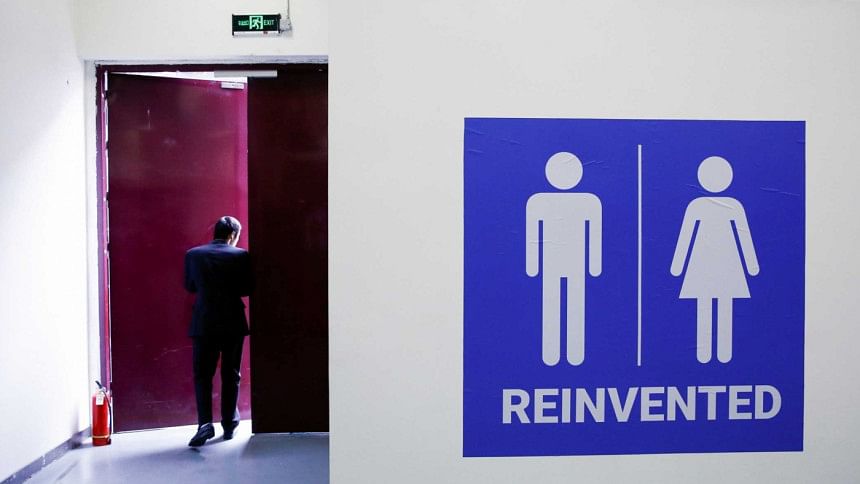Toilets: The only shame is the water we waste

Toilets do not, admittedly, make for a great dinner table conversation—though a few younger people might disagree. In fact, most of us are embarrassed to talk about toilets at all. But sanitation is an enormous health issue. The World Health Organization (WHO) estimates that around 2.3 billion people in the world lack basic sanitation facilities such as toilets or latrines, contributing to various diseases. It is time to move beyond the shame we feel in talking about toilets to serious consideration of solutions. And what better day to talk about them than today, World Toilet Day?
Admittedly, I can't help but laugh when I see signs that declare an Open Defecation Free Zone, but one of my dogs was magnetically attracted to the results of open defecation, and so I realised how common it is in outdoor spaces here in Dhaka. We need more free public bathrooms for the safety and comfort of all our residents, as well as expanded sanitation in lower-income areas.
The simple solution is not, however, to simply try to guarantee that everyone has access to a flush toilet. Most of us, when we flush the toilet, don't think about the utter stupidity, in an overpopulated world with insufficient clean water, of dumping our waste into clean water and flushing it all away. Nor do we tend to reflect on where the waste goes. "I think that you should really make people understand how stupid it is to poop into clean water," says Cecilia Lalander, a researcher in environmental engineering at the Swedish University of Agricultural Sciences in Uppsala. In addition to the international shortage of water, sewerage treatment requires enormous amounts of money and energy, and a lot of that sewerage gets dumped raw into rivers and oceans.
Decades ago, when I was working in the tiny Central American country of Guatemala, I used a composting toilet for the first time. It was in someone's home, though the ones I've used since are generally outdoors. It was clean. There was no smell. There were no cockroaches. It was pretty simple to deposit things in the proper holes, then to toss a little ash or sawdust in with the faeces. It was a remarkable contrast to the many latrines I had used, which are temporary, stink, and attract roaches.
I have since had the opportunity to learn a bit more about ecological sanitation, ecosan in short, which includes marvels like composting toilets. (Something I had not known is that urine contains all the valuable nutrients; dilute it with water and it makes a great fertiliser.) A few simple principles are helpful. Waste is not a useful concept—everything we treat as waste is potentially a valuable resource that can be put to good use. This is certainly the case with our so-called bodily wastes, which are full of important and difficult to obtain nutrients that we need to grow food. A circular economy would take all kinds of "waste," including manufactured products at the end of their lives, and turn them back into resources. We should certainly be doing that with what we otherwise flush down the toilet.
Another principle, mentioned above, is that clean water is far too precious to be wasted in toilets. Toilets are the biggest user of water in people's homes. We could either use grey water—water recycled from sinks—to flush our toilets, or use composting toilets. Clean water should be preserved for the uses for which it is essential.
Composting toilets are gaining popularity at festivals and rural homes—and beyond. There are sewerless buildings even in the United States. For example, the Bronx Zoo in New York City decided to forgo an extremely expensive sewer connection, instead installing composting toilets. The Bullitt Center in Seattle—a six-storey, 50,000 square feet building—also uses composting toilets. In San Francisco, the new office building of the Public Utility Commission treats wastewater, which is then used to flush toilets, reducing water consumption by 60 percent.
In Haiti, Sustainable Organic Integrated Livelihoods (SOIL) is building composting toilets. The toilets reduce the spread of diseases like cholera and typhoid, create jobs, and restore local environments. The compost supports agriculture and reforestation efforts in Haiti, providing valuable nutrients and improving the ability of soil to sequester carbon. The compost also contributes to climate adaptation by promoting plant growth, stabilising soils, and reducing the impact of flooding and droughts.
We have a lot to learn from these great examples.
Finally, I must recommend a wonderful book named "The Big Necessity: The Unmentionable World of Human Waste and Why It Matters," by Rose George. George dives (literally) into the world of sewers as well as discussing toilets, helping us overcome our shame and understand the need for more ecological solutions to our great sanitation crisis.
Debra Efroymson is executive director of the Institute of Wellbeing, Bangladesh, and author of "Beyond Apologies: Defining and Achieving an Economics of Wellbeing."

 For all latest news, follow The Daily Star's Google News channel.
For all latest news, follow The Daily Star's Google News channel. 



Comments